This content was published: March 3, 2017. Phone numbers, email addresses, and other information may have changed.
College remembers fateful Executive Order 9066 that started Japanese-American internment
Story by Katherine Miller. Photos by James Hill.
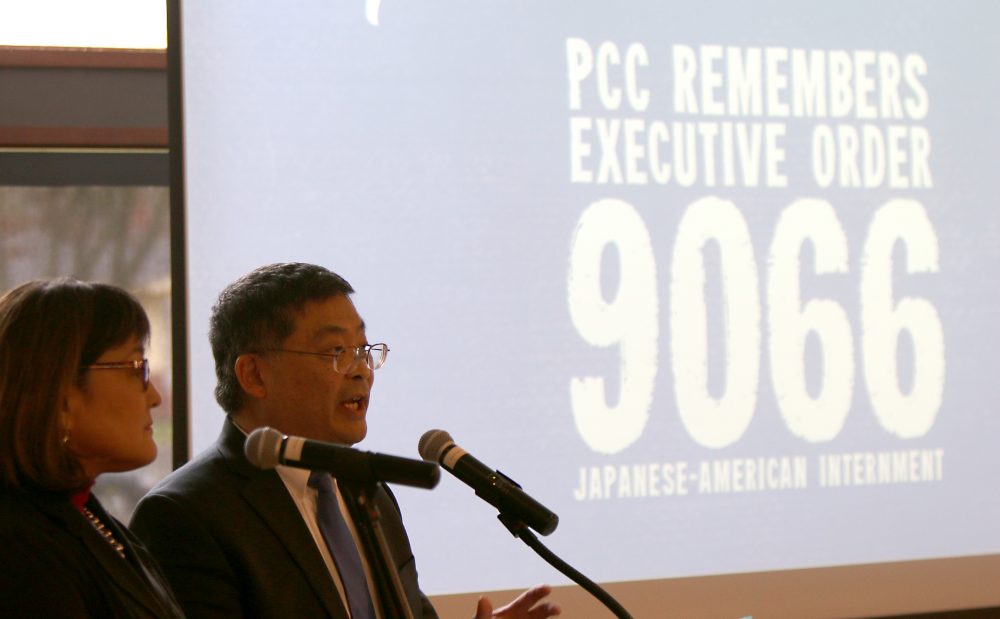 During World War II, many in the U.S. insisted that residents of Japanese heritage posed a threat as spies or saboteurs. Although this fear was unsubstantiated, on Feb. 19, 1942, President Franklin D. Roosevelt signed an executive order that forced more than 120,000 Japanese-Americans from their homes on the West Coast and incarcerated them in bleak camps for up to four years. Most were citizens or legal permanent residents, and half of them were children.
During World War II, many in the U.S. insisted that residents of Japanese heritage posed a threat as spies or saboteurs. Although this fear was unsubstantiated, on Feb. 19, 1942, President Franklin D. Roosevelt signed an executive order that forced more than 120,000 Japanese-Americans from their homes on the West Coast and incarcerated them in bleak camps for up to four years. Most were citizens or legal permanent residents, and half of them were children.
Roosevelt himself referred to the centers as “concentration camps.” Although these never reached the level of brutality of the camps run by the Nazis or Japan’s government, as one historian said, “they remain a dark mark on the nation’s record of respecting civil liberties and cultural differences.”
Internees were sent to 10 camps in remote areas of seven western states, most of them in arid and semi-arid places where life would have been harsh under even ideal conditions. In some cases families were separated and sent to different camps.
The camps were surrounded by barbed wire and armed guards round the clock. Housing was mainly tarpaper barracks, which were bitterly cold in the winter and sweltering in the summer. There was no running water, and no furnishings were provided except a coal-burning stove, canvas cots and a single bare lightbulb.
The internees had communal showers and toilets and ate army-style food in mess halls. Although the U.S. government hoped the internees could make the camps self-sufficient by farming, growing food in the arid soil proved difficult.
There were people who died due to inadequate medical care and stress, and studies show internees have suffered more than twice the incidence of heart disease and premature death than non-interned Japanese-Americans.
Meanwhile, some of the internees volunteered for military units that were mostly Nisei (Americans born to Japanese immigrants). One of those was the U.S. Army’s 442nd Regimental Combat Team, which went on to become what today is still the country’s most decorated unit.
When the war ended, internees were often unable to go back to their hometowns because hostility against Japanese-Americans remained high; several communities displayed signs demanding that the internees never return. As a result, many lost their land and livelihoods and were forced to start over elsewhere.
Today in several states, the signing of Executive Order 9066 is commemorated as the Day of Remembrance. For its 75th anniversary, PCC recently held an event at Southeast Campus, which sits in an area that once included many farmers of Japanese heritage and today has a high proportion of students who are refugees or immigrants.
PCC President Mark Mitsui welcomed an overflow crowd in the Community Hall Annex and recounted how his own family was among those interned during WWII. “It’s really important for us to remember the past so we don’t repeat its mistakes,” he said.
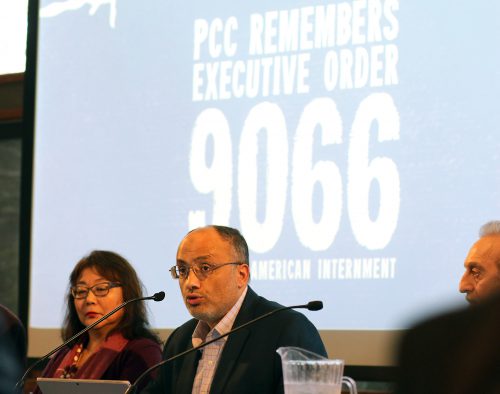
Wajdi Said, president of Oregon’s Muslim Educational Trust, talked of how Western history books ignore the many contributions of Islamic civilization, and that education is vital to fighting “Islamaphobia” and ensuring peaceful coexistence.
“My mother made it very clear: The Japanese-Americans hadn’t done anything wrong. And history shows that there was no evidence of sabotage, no evidence of disloyal acts, no trial, no opportunity for legal defense, no opportunity for appeal. My family was very, very vocal about what happened, and it was sort of a family mission to educate people so this would never happen again.”
Mari Watanabe, executive director of the nonprofit Partners in Diversity, read an excerpt of Senate Concurrent Resolution 14, which acknowledges the anniversary of the signing of EO 9066 and recognizes national Day of Remembrance. The resolution passed unanimously in the state senate in February and will be taken up by the house later in March.
Lynn Fuchigami Longfellow, executive director of the Oregon Nikkei Legacy Center, gave a presentation on the craft of senninbari, muslin belts that were traditionally embroidered by Japanese women with 1,000 stitches and given as talismans to men going off to war. Longfellow displayed a senninbari made in a camp for a Japanese-American soldier who served the U.S. in the 442nd regiment, and then invited guests to add a stitch to a new belt that will be part of a community project.
“We need to realize that we are in a struggle right now, and communities are being harmed and challenged,” said Longfellow. “This symbolic gesture and community project will remind us that we must stand together during these uncertain times.”
Following was the key event of the afternoon, a panel discussion with five civic and educational leaders. They shared what they consider to be the disturbing parallels between what Japanese-Americans endured during World War II and the racially motivated fear and hatred that many Muslims and refugees face today.
John Shaw, a PCC history instructor, said that despite Oregon being a liberal state, “we should acknowledge the West Coast’s legacy of virulent anti-Asian racism from the 1880s through World War II and beyond.” That racism, and not just Japan’s military aggression, played an important part in the signing of EO 9066, he said.
Shaw emphasized that although Japanese-Americans were interned after the U.S. formally declared war on Japan under Article I, no such declaration has been made in the countries that President Trump has singled out in his proposed travel ban.
“As a nation then and now, we were faced with the inherent tension between government’s emergency war powers and the individual constitutional rights of due process and equal protection under the law,” said Shaw. During WWII “politics and racism trumped law,” he said. “Politics trumped individual rights. Politics trumped the Constitution and the Bill of Rights amidst a national security crisis.”
Panelist Peggy Nagae, a Portland attorney, served on the National Committee for Redress of the Japanese-American Citizens League and was one of the key individuals in the movement that succeeded in 1988 in securing a formal apology and reparations from the U.S. government. Nagae recounted how EO 9066 was not implemented in Hawaii, where the attack on Pearl Harbor occurred and where 30 percent of the residents were of Japanese heritage. Instead, the order was implemented on the West Coast in a “racially targeted way” that denied Japanese-American citizens their rights and protections under the law.
“There was nothing in the executive order that said Japanese-Americans … They said ‘persons of Japanese ancestry.’ It was up to the military commanders to interpret that order.” Nagae said they did so without any evidence that Japanese-Americans were guilty of sabotage or more loyal to the Emperor of Japan than to the U.S., as claimed by Gen. John DeWitt, a key figure in the evacuation.
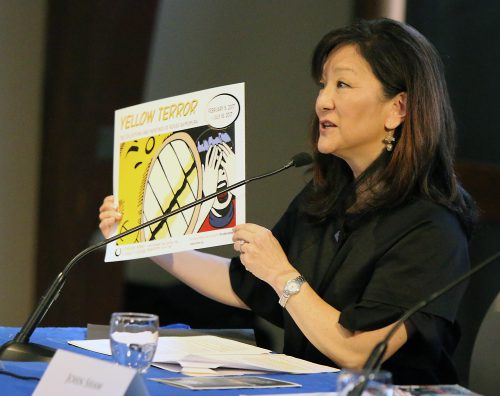
Lynn Fuchigami Longfellow, executive director of the Oregon Nikkei Legacy Center, gave a presentation on the craft of senninbari, muslin belts that were traditionally embroidered by Japanese women with 1,000 stitches and given as talismans to men going off to war.
That racism resonates today for members of Portland’s Muslim community. Wajdi Said, president of Oregon’s Muslim Educational Trust, talked of how Western history books ignore the many contributions of Islamic civilization, and that education is vital to fighting “Islamaphobia” and ensuring peaceful coexistence.
“By knowing each other, we will be able to excel. We will be able to be agents of that cultural diplomacy that we need to create.” Said said that the Muslim Education Trust holds an open house every Saturday, with a dinner and a lecture, and that the gatherings are open to anyone, regardless of religious or political affiliation.
The number of Muslim immigrants in the Portland area has more than doubled since the early 2000s to about 25,000, many of them from countries that are embroiled in war, such as Somalia and Yemen. Said urged PCC to support its students from these countries, because if they lose their student status, they could face an uncertain future in their home countries.
Harry Anastasiou, Conflict Resolution Chair at Portland State University, was the final panelist. He addressed how social injustice and inequity lead to prejudice and marginalization, which in turn can help drive a country to engage in protracted wars and eventually lose vital democratic protections.
“If you look at the legislation that takes place during periods of protracted war, you see something very astonishing: All the laws that are enacted during wartime tend to be undemocratic laws, but we never identify them as such. We call them martial law or emergency measures, but we identify them as such because they are fundamentally undemocratic. What under peace conditions was illegal and unthinkable, under war conditions have to be pursued.”
“Earlier we were called upon to join our voices in saying never again,” concluded Anastasiou. “I want to remind us that those were the words uttered by Europeans at end of World War II, but the difference was their ‘never’ was never again war.”
For links to resources about the internment of Japanese-Americans — including historic manuscripts, videos, websites, images and books — visit PCC’s Research Guide, http://guides.pcc.edu/ExecutiveOrder9066


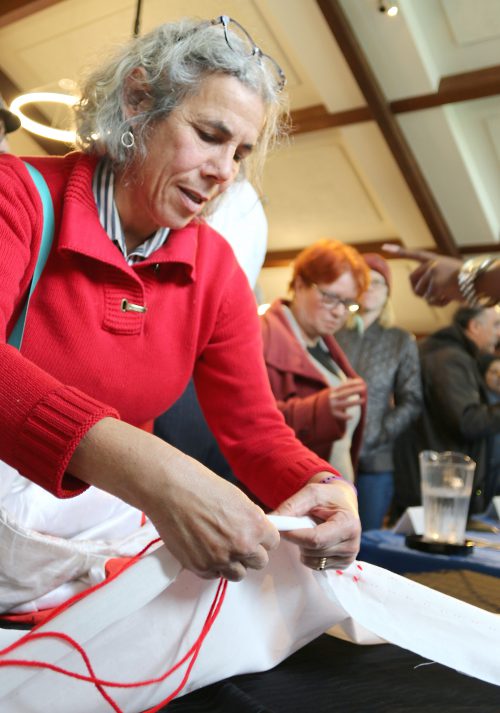
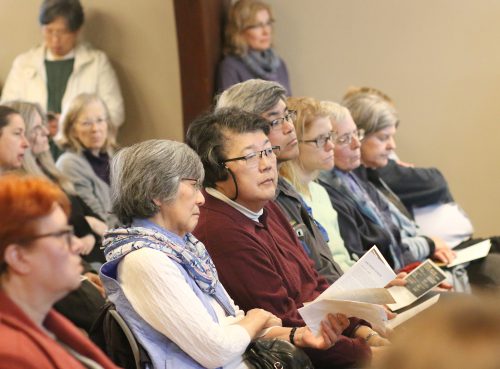
History is always interesting, but it becomes less interesting when it seems that it is being wielded as a propaganda tool. Sure, it is important to remember our nation’s missteps through our history, but it certainly seems that this particular instance is being mis-remembered with an agenda in mind – in fact the article quotes, “they remain a dark mark on the nation’s record of respecting civil liberties and cultural differences.” It seems that this article, and the panel, is more a thinly disguised attempt to pillory certain modern politicians and certain modern voters with misplaced guilt by inaccurate and misleading association. I shall elaborate.
First off, the panel and article completely ignore the fact that German-Americans and Italian-Americans were also targeted for internment by this Executive Order. While the Japanese-Americans were eventually given reparations, the German-Americans and Italian-Americans were not. Why is this injustice ignored by the panel and the article? This is either a sign or poor research or an agenda.
Of course, Japanese-Americans were the majority of those who were interned, but this can be adaquately explained by simple historical fact. The Japanese attacked us on December 7, 1941, soon thereafter Japanese fleets were sailing towards Midway and Japanese soldiers had even invaded Alaska at Attu Island. Meanwhile, Germany military was embroiled in a life and death struggle in Russia and was stalled outside of Moscow, Lenningrad, and had been repulsed at Rostov. Italy’s “war machine” was a widely-acknowledged joke. Neither Germany nor Italy had attacked the United States – they merely declared war out of treaty obligations within the Anti-Comintern/Tripartate pacts. Thus, the taking of more vigorous means against the most immediate threat was completely rational in the context of the time, even if the means, in this case internment of American citizens, was wrong and unjust. That these facts are not mentioned seems to indicate either incompetence, or an agenda.
Racism is constantly mentioned by the panel and article. The author of the article does not even seem to understand what racism is. I’ll quote from the article, “That racism resonates today for members of Portland’s Muslim community.” As Malcolm X learned when he undertook the Hajj to Mecca, the RELIGION of Islam embraces all races, white, yellow, brown, and black. This mistake is made several times in the article and seems to make the agenda increasingly clear.
Oh sweet agenda pushing fear mongering. We finally reach the denouement. President Trump’s travel ban. “Guided” by the poor historical research and grossly misinformed accusations of the author and panelists we can finally “see” how President Trump is racist and, by association, his supporters and those that voted for him. I reject this insinuation. The problem with EO 9066 was that it was an open-ended removal of the rights of American CITIZENS. President Trump’s travel ban was a very short term (three months) inconvenience for various non-citizens. This shockingly bad historical comparison seems to be further proof of an agenda. A much more apposite comparison would be Presidents Bush and Obama’s targeting of American citizens for death via drone strike or President Obama’s wire-tapping of journalists’ communications and imprisonment of journalists more journalists than all previous Presidents combined. Of course, apt historical comparisons is not what this is about, now is it? From the evidence, it seems much more likely that divisive race-baiting is the objective.
Also, I object to the caveats underneath the “Start the discussion” label. As a publicly financed educational institution you are required by law to allow me to make any speech I feel like making on campus or on the school’s web sites so long as I don’t incite violence or a few other items not covered under the First Amendment. There have been several court cases that have decided this issue. That I have refrained from any of the free speech that you imperiously proclaim to be “Verboten” just means I am a tasteful, decent person.
Thanks for your comment and your input, Josh. This article was based on the opinions and personal experiences shared by the panelists and participants, many of whom had family members who were interned. As you describe, this chapter in U.S. history has many facets. PCC strives to view issues from all lenses, and the Remembrance Day event was one of those.
Frankly, I see only one viewpoint through which these issues are being viewed – one that does not really hold up when put under scrutiny; one that does not match historical record. The fact that my post was answered with such a pallid and brief boilerplate response only serves to further my suspicion that the dissemination of propaganda is goal.
Harry Anastasiou is a particularly hilarious addition to this panel. Lets examine his hyperbolic statement, “If you look at the legislation that takes place during periods of protracted war, you see something very astonishing: All the laws that are enacted during wartime tend to be undemocratic laws, but we never identify them as such. We call them martial law or emergency measures, but we identify them as such because they are fundamentally undemocratic.” I can only guess to what laws he was specifically referring to (remember, President Trump’s travel ban was an executive direction to enforce a law that was written in peacetime) but it makes me wonder if he would dare call the ACA undemocratic? What about the National Environmental Policy Act? Both were passed during wartime (or what constitutes wartime in the post WW2 USA) and both were hailed as emergency measures. Mr. Anastasiou also seems to be a big fan of both the EU and the UN – two bodies of un-elected, faceleless bureaucrats. In fact, the tyrannical, unelected EU will soon be dissolved by the peaceful, democratic forces of nationalism when the Netherlands and France choose to exit stage left (a la Brexit) this autumn. The man seems to talk out of both sides of his mouth… and his book “The Broken Olive Branch” will soon have to be retitled “The Broken Thesis.”
John Shaw seems also to have some problems with his thought processes. There is an ocean of difference between depriving American citizens of their rights for an indefinite time period, as happened to Japanase, German, and Italian Americans in WW2, and President Trump’s travel ban which temporarily (3 months) inconveniences non-US citizens. Does Mr. Shaw have an opinion on President Obama’s possible illegal use of the AUMF of Sept. 18, 2001 to destabilize the legitimate government of Syria? What about President Obama’s use of War Powers acts to wire-tap and imprison American journalists? I smell partisan hackery.
The net result seems to be the obfuscation of understanding, the propagation of marginal, extreme ideology, and baseless fear-mongering. Surely everyone is entitled to their opinion, but the baseless, anti-historical opinions that seem to be the only ones given a platform is very troubling. Or, to use a progressive code-word, “problematic.”
I can sit and deconstruct all this nonsense all day; I would not doubt that every single panelist has any number of un-examined assumptions that underpin a political belief system that does not hold water in reality. Intellectual diversity seems to be in very short supply.
I am very concerned that all viewpoints are not welcome, and there is further language in the article that seems to indicate such. I quote from the article, “That racism resonates today for members of Portland’s Muslim community….and that education is vital to fighting “Islamaphobia” and ensuring peaceful coexistence.” Apart from the hilariously incorrect usage of the word racism (Islam is a religion, not a race. If you’re going to be intersectional, at least make sure your words intersect with their actual definitions), there is much that is troubling about this quote. You seem to brush off anyone with a legitimate concern about the nature of immigrants and refugees with the terms ‘racism’ and ‘islamaphobia.’ These words serve merely to defame and paint your opponents as inherently bad people and they in no way counter their justifiable and legitimate arguments. Heck, ‘islamaphobia’ sounds like some terrible disease! Using those words instead of engaging in actual argument and discussion leads, and I’ll quote Mr. Anastasiou, “to prejudice and marginalization.” So who are the closed minded bigots here?
Josh – You obviously took a big chunk of time composing your fake outrage, so I will respond the way you expect and deserve. You are being disingenuous for three reasons:
First, complaining your “free speech” is being censored is crap. You prattled on and on over three posts and about 1200-1500 words and nobody “censored” you in anyway. You are not a victim.
Second, you did not come here for a “discussion.” You wrote these tedious comments to prove your conservative “I am a victim” worldview and complain about strawman “liberals.” If you really wanted a conversation you would have asked a few questions and considered the speakers point of view. Instead you wove fake outrage and pathos-based “facts” together into a stump speech that only reinforces your point of view and does nothing the actually push forward this important conversation about government, oppression, and hate.
Third, just because you know how to use big words and read a few books about WWII history written by Bill O’Riely does not make you an expert. Your arguments are full of faulty logic such as false equivalencies (e.g. 11,000 Germans Nationals were detained, interviewed and released, a far different experience from the AMERICANS WHO WERE JAPANESE) and jumping to conclusions, and…. Gawd–I do not have enough time to “deconstruct” your superficial and faux-intellectual arguments. Really, you sound like an idiot.
Furthermore, you have no idea what the terms “deconstruct,” “racism,” and “intersectionality” mean. Please, go take a class on these terms before you throw them around and dishonor 100 years of hard work by post-modern, feminist, social science, and anthropology scholars. Also, WE ARE AT WAR, and have been about fifteen years now.
Seriously, man, knock it off. The liberals you hate and think are stupid in reality are a bunch of moderates like myself who are sick to death of people like yourself screaming about free speech and censorship. Screaming something over and over does not make it true.
You are dissentious because you are not looking for an actual academic debate and conversation. You only want to prove liberals wrong so you can feel vindicated and justified in your fake, hystrionic victimization.
Thank you Josh for expressing your opinions, I agree with most of your points. There is absolutely a narrative being pushed that anyone who disagrees with the leftist agenda schools are pushing must somehow be racist, sexist, or bigoted in some way. As a student at PCC I have felt the weight of peer censorship and a refusal to entertain any viewpoint that doesn’t fall in line with the crowd. I attended the seminar on this event and not once were Italian and German internment mentioned. Racism was portrayed as the primary justification for the internment. People are sick of the race baiting and anti-white guilt tripping that PCC pushes at every level of its pedagogy.
Aaron – First, I never once said that I was being censored. I merely pointed out the fact that PCC seems to be engaging in ‘soft’ prior restraint with their caveats. Learn to read.
Second, like many liberals (a word I haven’t written until just now, again, learn to read), you are attributing motive and calling an argument. You also show the typical leftist trait of knowing exactly how I feel and think. Furthermore, you put facts in quotation marks to imply that what I was saying was not factually accurate and also implying that you, the liberal, are the educated one without ever having directly addressed anything I said with any sort of counter-facts or proof. You completely ignore the numerous questions I did ask and merely attributed motive by saying I did not come here to discuss. Where did I ever say I was a victim? I merely pointed out that the panel was one-sided in its ideology and that the caveats of the discussion rules (which you broke, by the way) skirt on the fringes of legality. Again, learn to read and learn to debate.
Third, German-Americans and Italian-Americans were interned during WW2. They even have an organization: http://gaic.info/ . Thus no false equivalency QED. Learn to research. Or you can dehumanize those German and Italian Americans because they don’t fit into your racist narrative. I’ve never read a single book by Bill O’Riley and find him rather insufferable. I do have an extensive historical library at my home, however.
Furthermore, ohhh booooo, you mad bro? You mad bro because I took your pathetic leftist buzzwords and made them into a joke? How about you intersect with a sense of humour. Or maybe deconstruct your hang ups and lighten up. I know exactly what these words mean but I am not going to use them in the way your narrow, humourless, bigoted ideology demands because it restricts thought, creativity, and joy. I’m having fun, you’re not. And that is funny.
Seriously man, I’m not going to knock it off. You didn’t answer anything I wrote, you gave no facts, you personally attacked me, you attributed motive, and you condescended to me and everyone who does not agree with you. Where did I ever say I hated anyone? Again, oh wise leftist, you surely have some crystal ball to see into my soul and know what I’m feeling and what I have read. You’re a bundle of regurgitated talking points with no point. And Donald Trump is your President! :)
Have a wonderful day.
Aaron – Oh, and PS, we are, technically, not at war and have not been since the end of WW2. Since WW2 the United States Congress has not issued a formal declaration of war against any nation. They have issued resolutions authorizing military operations, but no declarations of war. So the one thing you posited as fact is not actually factual.
Also, I considered flagging your post for your personal attacks on me, but really, it only strengthens my posts (as if they needed that!) because your response is just so weak. At some point I may grow tired of winning.